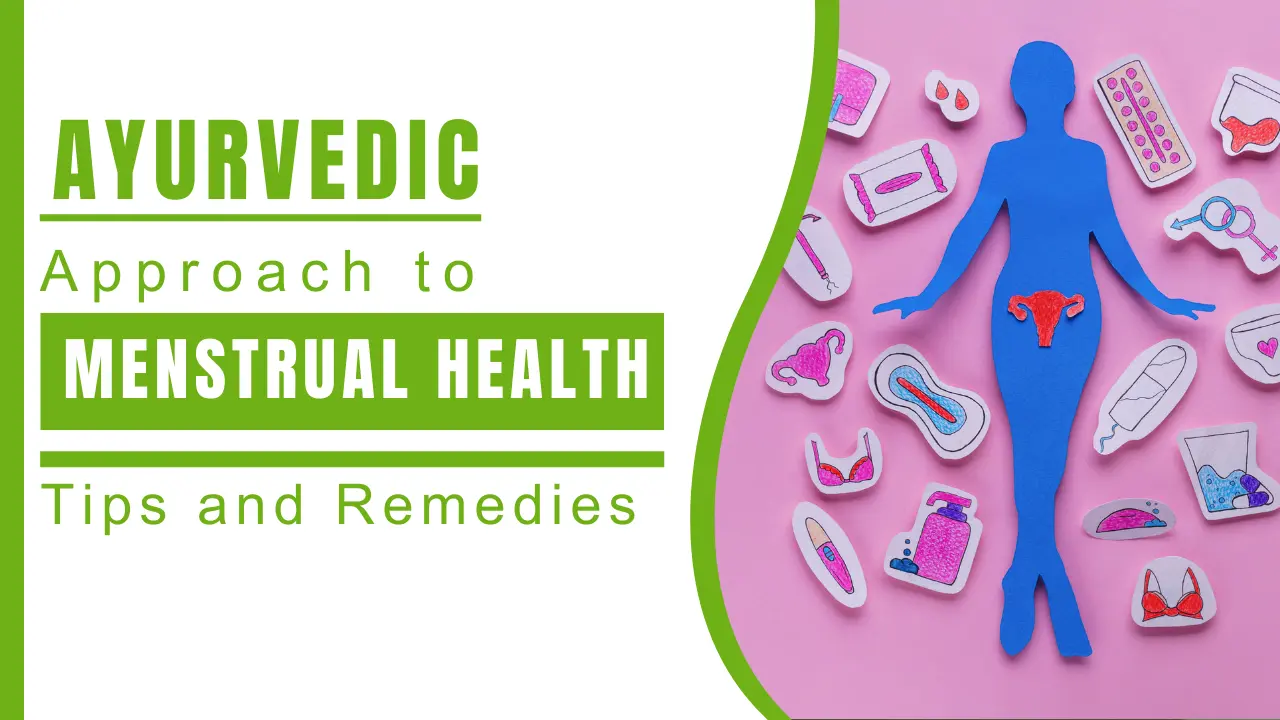Menstrual health is a vital aspect of women’s overall health. Ayurveda provides a holistic approach to managing menstrual health through natural remedies and lifestyle changes. This blog will guide you through Ayurvedic tips, herbs, and practices to support a healthy menstrual cycle.
Table of Contents
Understanding Menstrual Health in Ayurveda
Ayurveda views menstrual health as a reflection of a woman’s overall balance of doshas (Vata, Pitta, and Kapha). An imbalance in these doshas can lead to menstrual issues such as irregular periods, cramps, and mood swings. By maintaining a balance of doshas, you can achieve better menstrual health.
Ayurvedic Tips for Menstrual Health
Follow a Balanced Diet
A balanced diet is crucial for maintaining menstrual health. Include plenty of fresh fruits, vegetables, whole grains, and lean proteins in your diet. Avoid processed foods, excessive caffeine, and sugar, which can exacerbate menstrual problems.
Stay Hydrated
Drinking adequate water helps flush out toxins and supports overall health. Aim to drink at least 8 glasses of water a day to stay hydrated and support your menstrual cycle.
Exercise Regularly
Regular physical activity helps improve blood circulation, reduce stress, and maintain hormonal balance. Yoga, walking, and light aerobics are excellent forms of exercise to support menstrual health.
Practice Stress Management
Stress can significantly impact your menstrual cycle. Incorporate stress-relieving activities like meditation, deep breathing, and mindfulness into your daily routine to manage stress effectively.
Maintain a Regular Sleep Schedule
Adequate sleep is essential for hormonal balance and overall health. Aim for 7-8 hours of restful sleep each night to support your menstrual cycle.
Best Ayurvedic Herbs for Menstrual Health
Ashoka
Ashoka is known for its ability to regulate menstrual cycles and reduce menstrual pain. It helps balance hormones and supports overall reproductive health.
Shatavari
Shatavari is a powerful herb for women’s health. It helps balance hormones, reduce menstrual cramps, and support reproductive health.
Aloe Vera
Aloe vera helps regulate menstrual cycles and reduce menstrual pain. You can consume aloe vera juice to support your menstrual health.
Ginger
Ginger is effective in reducing menstrual cramps and inflammation. Drink ginger tea or add ginger to your meals to benefit from its medicinal properties.
Turmeric
Turmeric has anti-inflammatory and antioxidant properties that help reduce menstrual pain and support overall menstrual health. Add turmeric to your diet or take turmeric supplements for relief.
Ayurvedic Supplements for Menstrual Health
Herbal Menstrual Health Supplements
Ayurvedic supplements containing herbs like Shatavari, Ashoka, and Turmeric can help balance hormones, reduce menstrual pain, and support overall menstrual health.
Iron Supplements
Iron is essential for maintaining healthy blood levels, especially during menstruation. Ayurvedic iron supplements can help prevent anemia and support overall health.
Omega-3 Fatty Acids
Omega-3 fatty acids have anti-inflammatory properties that help reduce menstrual pain and support hormonal balance. You can take omega-3 supplements or include omega-3-rich foods in your diet.
Additional Tips for Managing Menstrual Health Naturally
Eat a Nutritious Diet
A nutritious diet rich in vitamins and minerals supports menstrual health. Include foods high in iron, calcium, and magnesium, such as leafy greens, nuts, and seeds.
Avoid Caffeine and Alcohol
Excessive caffeine and alcohol can disrupt hormonal balance and worsen menstrual symptoms. Limit your intake of these substances to maintain hormonal balance.
Use Heat Therapy
Applying heat to your lower abdomen can help relieve menstrual cramps. Use a heating pad or take a warm bath to relax your muscles and reduce pain.
Track Your Menstrual Cycle
Tracking your menstrual cycle helps you understand your body’s patterns and identify any irregularities. Use a menstrual tracking app or keep a journal to monitor your cycle.
Conclusion
Ayurveda offers a natural and holistic approach to managing menstrual health. By following these Ayurvedic tips, incorporating the recommended herbs and supplements, and making lifestyle changes, you can support a healthy menstrual cycle. Remember, consistency and mindfulness are key to achieving and maintaining good menstrual health.
FAQs
What are the best Ayurvedic herbs for menstrual health?
Ashoka, Shatavari, Aloe Vera, Ginger, and Turmeric are some of the best Ayurvedic herbs for managing menstrual health naturally.
How does stress affect menstrual health?
Stress can disrupt hormonal balance, leading to irregular periods, menstrual cramps, and other menstrual issues. Managing stress through activities like meditation and yoga can support menstrual health.
Can Ayurvedic supplements help with menstrual health?
Yes, Ayurvedic supplements containing herbs like Shatavari, Ashoka, and Turmeric can help balance hormones, reduce menstrual pain, and support overall menstrual health.
By embracing the holistic approach of Ayurveda, you can manage your menstrual health effectively and enjoy better overall well-being. Incorporate these natural tips and remedies into your daily routine to support a healthy menstrual cycle and lead a balanced life.

